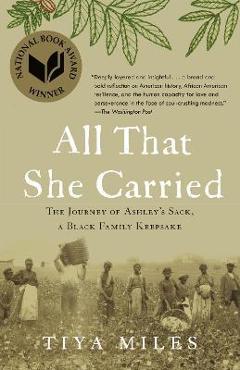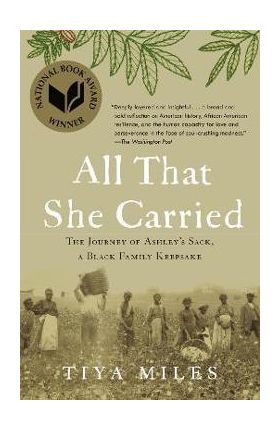Cosul este gol

All That She Carried: The Journey of Ashley's Sack, a Black Family Keepsake - Tiya Miles
Comparati
Codul produsului: 27293231
Conectează-te ca să te putem notifica când primești un răspuns
NATIONAL BOOK AWARD WINNER - A renowned historian traces the life of a single object handed down through three generations of Black women to craft an extraordinary testament to people who are left out of the archives. KIRKUS PRIZE FINALIST - LONGLISTED FOR THE PEN/JOHN KENNETH GALBRAITH AWARD - ONE OF THE TEN BEST BOOKS OF THE YEAR: The Washington Post, Slate, Vulture, Publishers Weekly - ONE OF THE BEST BOOKS OF THE YEAR: The New York Times, NPR, Time, The Boston Globe, Smithsonian Magazine, Book Riot, Library Journal, Kirkus Reviews Deeply layered and insightful . . . [a] bold reflection on American history, African American resilience, and the human capacity for love and perseverance in the face of soul-crushing madness.--The Washington Post A history told with brilliance and tenderness and fearlessness.--Jill Lepore, author of These Truths: A History of the United States In 1850s South Carolina, an enslaved woman named Rose faced a crisis, the imminent sale of her daughter Ashley. Thinking quickly, she packed a cotton bag with a few precious items as a token of love and to try to ensure Ashley's survival. Soon after, the nine-year-old girl was separated from her mother and sold. Decades later, Ashley's granddaughter Ruth embroidered this family history on the bag in spare yet haunting language--including Rose's wish that It be filled with my Love always. Ruth's sewn words, the reason we remember Ashley's sack today, evoke a sweeping family story of loss and of love passed down through generations. Now, in this illuminating, deeply moving book inspired by Rose's gift to Ashley, historian Tiya Miles carefully unearths these women's faint presence in archival records to follow the paths of their lives--and the lives of so many women like them--to write a singular and revelatory history of the experience of slavery, and the uncertain freedom afterward, in the United States. The search to uncover this history is part of the story itself. For where the historical record falls short of capturing Rose's, Ashley's, and Ruth's full lives, Miles turns to objects and to art as equally important sources, assembling a chorus of women's and families' stories and critiquing the scant archives that for decades have overlooked so many. The contents of Ashley's sack--a tattered dress, handfuls of pecans, a braid of hair, my Love always--are eloquent evidence of the lives these women lived. As she follows Ashley's journey, Miles metaphorically unpacks the b


